1. THE ANCIENT GREEK LEGACY

ALEXANDER AND HELLENISM
The Late 300s to 3 B.C.
CONTENTS
 A general overview of the Hellenistic A general overview of the Hellenistic
Age
 Alexander ... and his conquest of the Alexander ... and his conquest of the
East
 Alexander's Empire is carved up Alexander's Empire is carved up
 The Antigonid Dynasty The Antigonid Dynasty
 The Seleucid Empire in the East The Seleucid Empire in the East
 Ptolemaic Egypt Ptolemaic Egypt
 The development of Hellenistic culture The development of Hellenistic culture
The textual material on this webpage is drawn directly from my work
A Moral History of Western Society © 2024, Volume One, pages 52-71.
A Timeline of Major Events during this period BC
359 Philip II comes to power in Macedon (r. 359-336 BC)
340s Demosthenes issues his "Philippics," publicly denouncing Philp as a great danger to Athens
338 Philip takes control as hegemon of Athens and Thebes after the Battle of Chaeronea
336 Philip is murdered by a member of his own bodyguard ... bringing young Alexander to power
334 Alexander (only 22!) takes on the Persian Empire, starting with the battle at Granicus
333 Alexander's army destroys the Persian army at Issus ... then takes Syria and Palestine
332 Alexander takes Egypt ... and begins to build the city of Alexandria, Egypt
331 Persia is completely defeated at Gaugemela ... Alexander then taking the Persian throne
328 Alexander begins his march deeper into central Asia ...
326 Alexander's army reaches all the way to India (at the Indus River)
But his tired troops then refuse to advance further East
324 An exhausted Alexander finally finds himself back in Persia
323 A young Alexander (only 32) dies in Babylon ... mourned deeply by his troops
Cavalry general Perdiccas takes administrative control of the empire
Ptolemy I Soter however rules Egypt (323-283 BC)
321 Perdiccas is assassinated ... beginning the breakup of Alexander's empire
319 Alexander's wife Roxana and his son Alexander are poisoned ... ending all hope of union
305 General Seleucus Nicator rules (305-281 BC) from Babylon nearly all of the Asian portion of the Empire
Ptolemy takes the title of Egyptian Pharoah ... establishing the Ptolemaic dynasty in Egypt
283 Ptolemy II Philadelphia (283-246 BC) secures Ptolemaic rule in Egypt against Seleucid ambitions
He also has the
Jewish Bible translated into Greek (the "Septuagint Bible")
277 Antigonus II takes the kingship in Macedonia ... and then Greece
247 Arsacid Parthia breaks from from the Seleucid Empire ... reviving Persian resistance
217 Young Antigonid King Philip (221-179 BC) ends the Achaean-Aetolian war
200 Romans, in alliance with Greek rebels, bring Philip's Greece under Roman authority
188 Antiochus III's Seleucid army is defeated by Rome ... giving Rome dominion in much of the former Seleucid Empire
168 Romans defeat the Macedonian army at Pydna ... 300,000 Greeks carried off to slavery
63 Mithridates loses the last of the Selucid Syrian holdings with his defeat by Pompey
55 Ptolemy XII is placed back on the Egyptian throne ... but only as a Roman client
31 Marc Antony's Roman forces are defeated by Octavian's Roman forces at Actium
Marc Antony and
his lover Cleopatra VII chose suicide ... ending the Ptolemaic dynasty
Egypt is now just another Roman province
A GENERAL
OVERVIEW OF THE HELLENISTIC AGE |
|
Alexander the Great (356-323 BC)
The brief, meteoric rise (and sudden loss) of the young conqueror of
the Greek North – Alexander of Macedonia – marks a critical turning
point in the evolution of Greek or Western cosmology. Everything
that seemed to lead up to the life of this conqueror of the known
civilized world of his times and everything that proceeded onward from
this amazing life threw the comfortable Greek cosmology into confusion,
disorder.
The Decline of the Greek City-State
The century prior to Alexander's arrival on the scene had been a time
of gradual decline from the self-understood grandeur of Greece (during
the "Age of Pericles" around 450 BC). True, the material culture
of Greece even reached new heights during this period. But
the moral- ethical foundations of Greek's cherished public life had
been undergoing quite noticeable decay. From the time that the
Athenian citizenry pronounced the death sentence upon Socrates (399
BC), philosophers had begun to wonder about whether things were indeed
so orderly in Greece. Indeed, reaching back even to the beginning
of the "Troubled Times" of the wars of the city-states in Greece
(starting in 459 BC), Athens had been growing increasingly imperious in
its relations with its neighboring city-states. Power, wealth,
status seemed only to corrupt the Good Greek order.
Stoics, Epicureans, Skeptics
Around the time of Alexander (around 330 BC) a series of new schools of
political thought were founded by philosophers from around the Greek
realm (especially around its eastern borders). Though each of
these new schools was unique they all shared in common a view that the
private life was the only place that a person could trust things to go
right. They thus all drew back from the older Greek view that the
highest good for a person was in the contributions they might make to
the public life. These new philosophers instead looked within the
human soul in their search for order, good, truth, beauty. They
all tended to invite people to build a safe haven of life by withdrawal
from the public domain and a focus on personal intellectual
development. Here was where the blissful order could be
found. But some, like the Skeptics, were not even sure that this
was entirely a reliable haven. A sense of prevailing chaos seemed
to be getting a grip on the Greek mind.
Opening Up to the East
Alexander's conquest of the grand and vast Persian Empire to the East
in Asia began what some might feel ironically as the spiritual conquest
instead of the European West by the Asian East! Perhaps this is a
bit of an exaggeration. Yet certainly intimate contact with the
East through the new Greek Selucid (Syria and Palestine) and Ptolemaic
(Egypt) monarchies opened Greek culture to strong Eastern influences –
ones that reached to the heart of Greece, even to the venerable
Athens. Here a mystical vision of the divine order – perhaps not
too much different from Pythagoras' vision (whom we suspect had also
been profoundly influenced by Eastern thinking through his travels
there) – moved deeply into Greek thinking. Concepts such as life
after death (or – a return to life of an eternal soul as a new person),
notions such as the most noble life being found in a mystical union
with the very essence of God, these were ideas that began to take hold
in Greek thinking.
On-going Platonism and the new Stoicism stepped right into this thought
mode. So would elements of Judaism and, eventually, much of
Christianity.
ALEXANDER ... AND HIS CONQUEST OF THE EAST |
|
Philip II of Macedon (359-336 BC)
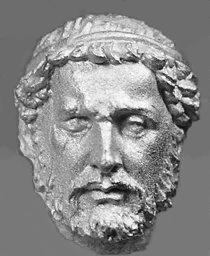 While
the city-states of Classical Greece seemed to be enjoying tremendous
prominence (when not fighting each other), a new power was growing to
the North of Greece: the semi-Greek kingdom, Macedonia, under its ruler
Philip II (382-336). Many of the Greeks, including some
influential Athenians, looked to Philip to rescue Greece from its
military and political follies. While
the city-states of Classical Greece seemed to be enjoying tremendous
prominence (when not fighting each other), a new power was growing to
the North of Greece: the semi-Greek kingdom, Macedonia, under its ruler
Philip II (382-336). Many of the Greeks, including some
influential Athenians, looked to Philip to rescue Greece from its
military and political follies.
But
others, most notably the Athenian statesman and orator Demosthenes, saw
in the ascendancy of Philip the end to Greek political values and
liberties. Demosthenes spoke fervently and often (his Philippics) about the dangers to Athens posed by Philip. But all to no avail.
The
son of the Macedonian King Amyntas, as a youth Philip was held hostage
by the Greek city-state of Thebes (at that time the strongest of the
Greek city-states). During that four-year captivity Philip
learned much about military and diplomatic strategy from his teacher
Epaminondas. He was able to return to Macedonia in 364 BC, where
he quickly proved himself in both battle and the conduct of diplomacy
... securing Macedonia from a threat coming from Thracians, Paeonians
and several thousand Athenian mercenary troops (359 BC).
That
same year, at age 23, he received the throne of Macedonia when the last
of his brothers died in battle. He immediately set himself to the
task of rebuilding his infantry corps or phalanx and proceeded to throw
Macedonian control over the surrounding states in northern Greece …
securing valuable gold fields in the region … bringing him frequently
in conflict with Athens. He spread Macedonian dominance to the
south in Thessaly (356-352 BC), turned again to focus on consolidating
his power at home in growing Macedonia, then in 349 BC resumed his
movement against Athens, Thebes and the other leading city states in
southern Greece. Only Sparta was spared the threat of Macedonian
domination. Finally in 338 he defeated the armies of both Athens and
Thebes at the Battle of Chaeronea, opening for him the opportunity to
create the League of Corinth with himself as its hegemon or
leader. By this diplomatic action he finally brought peace to
Greece … under Macedonian supervision (despite ongoing political
opposition urged by Demosthenes).
Then
in 336 BC he was murdered by one of his bodyguards on the way to the
wedding of one of his daughters. At this point the Macedonian
challenge seemed to have suddenly disappeared as quickly as it had
arisen. Or so many hoped.
Young
Alexander
 No
one was giving much thought to Philip's son, a young man of only
20. But Alexander surprised everyone by quickly revealing himself
to be every bit the man (even more so) than his father. Under his
father's sposorship, he had been carefully raised in Greek ways,
studied under Aristotle (when not off somewhere fighting battles!) –
thus combining personally the scholarly interests of his Athenian
teacher with the political talents of his Macedonian father. No
one was giving much thought to Philip's son, a young man of only
20. But Alexander surprised everyone by quickly revealing himself
to be every bit the man (even more so) than his father. Under his
father's sposorship, he had been carefully raised in Greek ways,
studied under Aristotle (when not off somewhere fighting battles!) –
thus combining personally the scholarly interests of his Athenian
teacher with the political talents of his Macedonian father.
Coming
to power in 336 BC, he quickly put down challenges to his kingship in
Macedonia ... and in Greece. He crushed and destroyed the
city-state of Thebes, sending a clear message to Athens to behave
(Demosthenes had turned his invective on Alexander since Philip's
death). Thus very quickly, Alexander demonstrated to the
surrounding Greek, Thracian and Illyrian peoples that, though young, he
was very much made of the same stuff as his father.
He
then in 334 BC moved to further galvanize his rule by turning the
combined Macedonian-Greek state he now ruled toward the idea of ending
the Persian threat to Greece forever. He intended to invade
Persia – and not just wait as they had in the past for the Persians to
take the initiative in their strained relations.
He
divided his Macedonian army (leaving some behind to keep his power
secure in Greece) and added a large number of Greek soldiers to his
ranks and then crossed into Asia Minor to raise the flag of
anti-Persian rebellion by the various subject peoples living there
under Persian tutelage.
When he and his army set off toward Asia Minor in 334 BC no one had any
idea of how far Alexander's ambitions in Asia were going to take them.
|
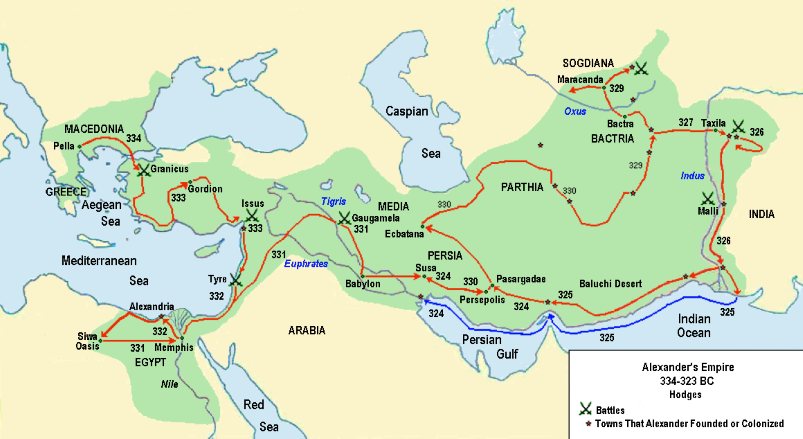
|
Granicus (334
BC)
Persian
royal power had been in decline for a while, corruption within the
bureaucracy was growing rapidly, and the subject peoples were quite
restless. Alexander saw his incredible opportunity as liberator
or deliverer of these subject peoples.
To
meet this challenge from Alexander, a Persian army was quickly
organized by the satraps of Asia Minor ... and proceeded to come out to
meet him at the Granicus River. The Persian forces expected to
demolish Alexander and his Macedonian-Greek forces in short order.
But
instead, Alexander and his army proceeded to crush the Persian forces
... much to the Persian dismay of the Persians. However,
Alexander was wounded in battle ... but continued to fight until the
Persians fled before him.
At this point the Persian regional capital at Sardis capitulated to
Alexander … and Alexander moved his troops onwards along the Ionian
coast (today's western coast of Turkey), with city after city going
over to his side (depriving the Persians of naval bases along the
Aegean Sea).
Then Alexander used the next months to consolidate his position as the new master of Asia Minor.
The Battle of Issus
(333 BC) and occupation of Syria/Palestine
He
then headed east towards Syria where in late 333 BC he met near the
town of Issus a huge Persian army ... led by the Persian king Darius
himself. But the area of the battlefield was narrow in scope, not
allowing Darius to bring the full force of his 400,000 man army against
Alexander's mere 40,000 troops. Alexander himself led a
cavalry charge straight into the Persian ranks … startling Darius and
causing him to flee … thus breaking the morale of his Persian army and
turning the battle into a slaughter of retreating Persians (and again,
also Greek mercenaries serving in the Persian ranks).
Onwards, towards Egypt
This
victory then opened up the eastern end of the Mediterranean to Greek
expansion. Indeed, Alexander easily entered Syria and Palestine
as liberator/conqueror, facing serious resistance only from Tyre and
Gaza, both of which he destroyed. Most other cities opened their
gates to the conqueror without resistance – and were met with fair
treatment.
Then
at this point he strangely turned away from chasing the humiliated
Persian Emperor ... and headed instead to Egypt. Here too he was
received without resistance ... in fact being received even as
liberator rather than as an enemy.
Was Alexander the son of a God? What might seem to be a mere side incident in the story is actually a
very major piece in Alexander's life. No doubt out of a desire to
get to the bottom of a story (and perhaps in part also out of a desire
to impress his troops) that Philip was not his true father – that
Alexander was actually descended on his father's side from one of the
gods – Alexander journeyed to the Siwa Oasis in the Libyan desert to
inquire of the famed priests of Ammon there as to the truth to the
story. They confirmed that indeed the story was true.
Indeed, Egyptian priests greeted him as a divine instrument of their
god Ammon and crowned him Pharaoh.
The establishment of Egypt's greatest city, Alexandria. While in Egypt he planted a Greek colony at the edge of the Nile delta
– a fabulous Greek-Egyptian city bearing (as did so many of the towns
or cities he founded) his name, Alexandria. It would soon grow to
outclass all other cities around the Mediterranean ... and hold that
position for centuries. Even with the rise of Rome, Greek
Alexandria retained the reputation for being the most sophisticated
city in the Western world. It would be the center of fabulous
Greek scholarship for at least another thousand years.
Gaugemela/Arbela and the defeat of Persia (331 BC)
But
soon it was time for Alexander to turn his attentions back to the
Persians. The Persians had been assembling the largest
multi-ethnic army ever seen before in western Asia. But
Alexander's army was more disciplined, more maneuverable and more
personally loyal to its leader than the Persian army. The two
prior defeats of the Persians also contributed to the high morale of
the Greeks and the nervousness of the Persians. In 331 BC the
Greeks and the Persians met in a mighty clash at the Battle of
Gaugamela (or Arbela). Once again the Greeks were victorious, and
once again the Persians and their king Darius were routed. Darius
was eventually hunted down (330 BC) – and put to death for his
cowardice by his own men as Alexander approached.
Victorious
in battle, Alexander now focused his attentions on consolidating his
rule over his newly acquired territories. Interesting, and
convenient for Alexander, even in the very heart of the Persian empire
Alexander was greeted as a liberator/conqueror. Babylon and even
Susa, the old Persian capital, greeted him as a liberator, and indeed
Alexander did what he could in service as "protector" of these grand
cities. He wanted to rule over a land of wealth, not ruin.
The sack of Persepolis
However
the new Persian capital of Persepolis proved to be a different
matter. The city tried to take a military stand in its own
defense – and chose the unwise tactics of parading before Alexander's
army 800 badly mutilated Greeks who had been captured earlier,
presumably as a ploy to demoralize the Greeks. Instead it merely
infuriated them (and Alexander) – and the Greek troops went wild,
slaughtering its inhabitants and burning Persepolis to the ground.
Consolidating his conquests by creating an East-West synthesis
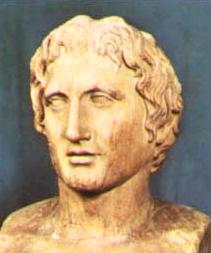 Though
Alexander's power was clearly based on the support of his very
practical-minded Macedonian-Greek army, Alexander soon began to
envision himself as a great Oriental god-king sent to rebuild
civilization in what he supposed was the entire reach of the
world. He planted cities with Greek colonists wherever he went,
urged his soldiers to take wives from among the Persians and other
Oriental peoples (as he himself did in marrying the Bactrian princess,
Roxana), and did what he could to rebuild Western Asian civilization on
a mix of Greek and Oriental culture. His loyal troops humored him
in his thoughts, though they themselves were very unlikely candidates
for ever seeing Alexander as a god – as the Orientals so easily came to
see their new ruler. Though
Alexander's power was clearly based on the support of his very
practical-minded Macedonian-Greek army, Alexander soon began to
envision himself as a great Oriental god-king sent to rebuild
civilization in what he supposed was the entire reach of the
world. He planted cities with Greek colonists wherever he went,
urged his soldiers to take wives from among the Persians and other
Oriental peoples (as he himself did in marrying the Bactrian princess,
Roxana), and did what he could to rebuild Western Asian civilization on
a mix of Greek and Oriental culture. His loyal troops humored him
in his thoughts, though they themselves were very unlikely candidates
for ever seeing Alexander as a god – as the Orientals so easily came to
see their new ruler.
Onward
to Central Asia and India
Alexander
would not let up on his conquering ways, particularly as he began to
learn of other lands that lay to the north and east beyond the Persian
empire. He pressed on with his Macedonian-Greek army, first into
central Asia (328 BC), where he faced bitter conditions and bitter
resistance and where there was very little of value (Roxana excepted!)
to add to his already vast dominions. He then turned eastward
(327 BC), again passing through bitter situations in Afghanistan in an
attempt to reach India with its rumored wealth and splendor.
Crossing the high Hindu Kush Mountains he descended into the Indus
River Valley (326 BC) where at the Jamnia River he defeated King Porus
and his Indian army – though turning them into allies after all.
The reluctant end to the conquering
Hearing
of the wealth of India further East along the Ganges River he decided
to press on with his conquests, only to be faced with firm resistance
from his troops. They would go no further East. In fact,
after nine years of conquest, they were ready to return home to Greece
and Macedonia. For the first time ever, Alexander and his
ambitions faced defeat. Against the resistance of his own troops
he could do nothing.
The
Journey Back to Babylon
He
thus turned South along the Indus River, ran into trouble at Malli,
where he led a charge and was nearly killed – but rescued by his own
troops – putting him in convalescence for several months, before
continuing his journey back towards the West. He divided up his
troops, able to send only half of them back to Babylon by ship, the
other half having to take the desert route (today's Balochistan) –
which through heat and thirst left ten thousand of his soldiers dead
along the way and Alexander himself physically and mentally exhausted
in his arrival back in Persia.
His Last Days
On
arriving at Babylon he cleaned out much of the corruption that had set
in on his administration during his absence. He then returned to
the program of integrating his Greek and Persian supporters – including
organizing (in 324 BC) a massive marriage ceremony between his Greek
soldiers and Persian women, taking two Persian princesses as additional
wives of his own (a very non-Greek concept). He then had
rebellions to face down, including one among his own Greek troops (also
324 BC). His last enterprise (323 BC) was to have been a massive
exploration of the water link between Babylon and Egypt by 1000 ships
he had built for the occasion. But his body was spending itself
out – not only because of his constant exertions, but because of his
deep drinking and carousing that went on for hours. Just prior to
his departure on this grand sailing expedition he caught a fever which
his tired body could not shake – and as he lay dying ten days later his
army passed silently before him to bid their hero farewell. He
died the next day, June 13, 323 BC.
Most
interestingly, Alexander is remembered greatly not only in the West but
also in the East ... where he is known as Iskandar ... and his exploits
celebrated there as much as they have come to be celebrated in the
West. He was truly an outstanding individual ... empowered by the
forces of heaven, which every religion (except secular materialism)
knows well as being the ultimate source of all human greatness.
Alexander himself knew this to be so in his own case.
|
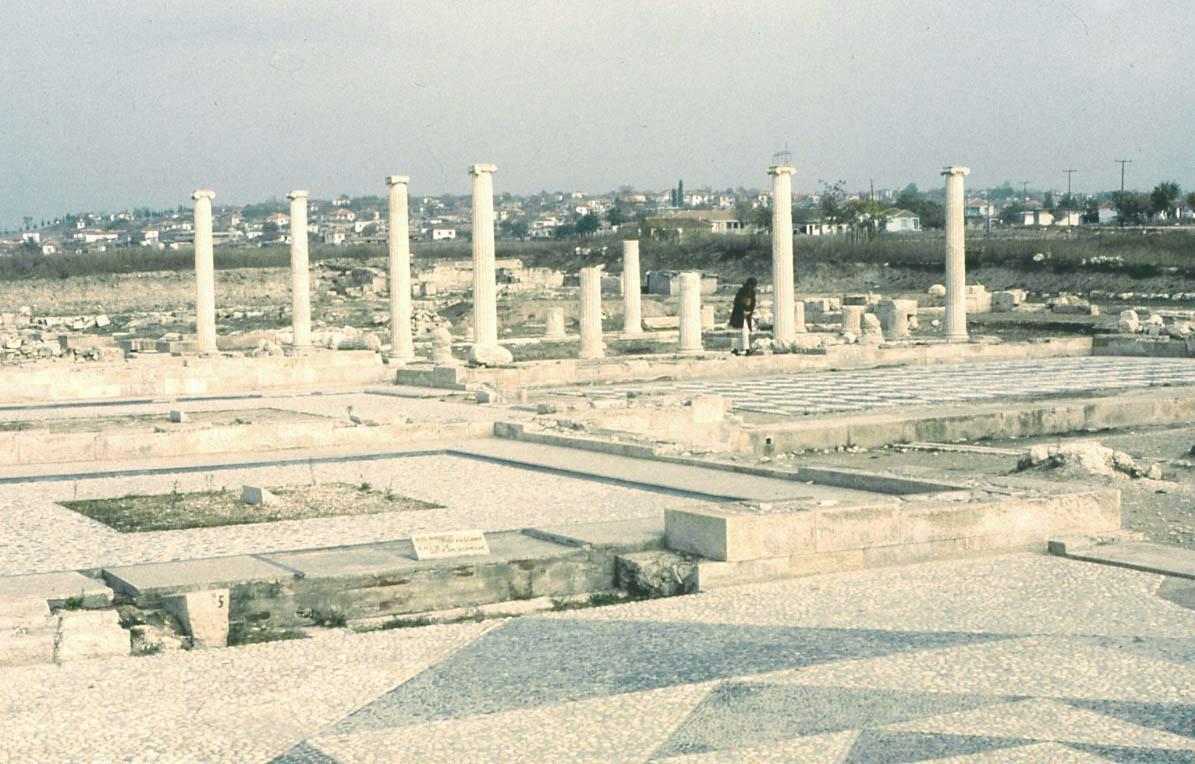 The palace at Pella in Macedonia
... where it all began
The palace at Pella in Macedonia
... where it all began
Miles Hodges
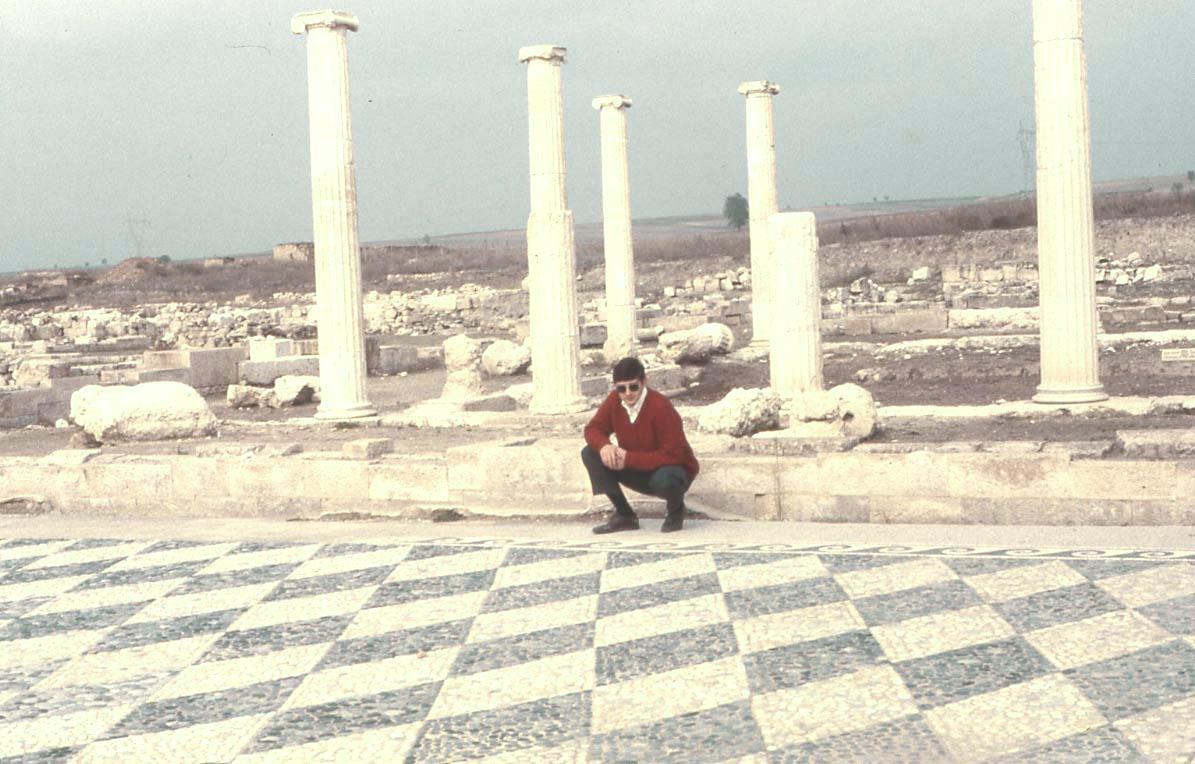 Miles Hodges
Miles Hodges
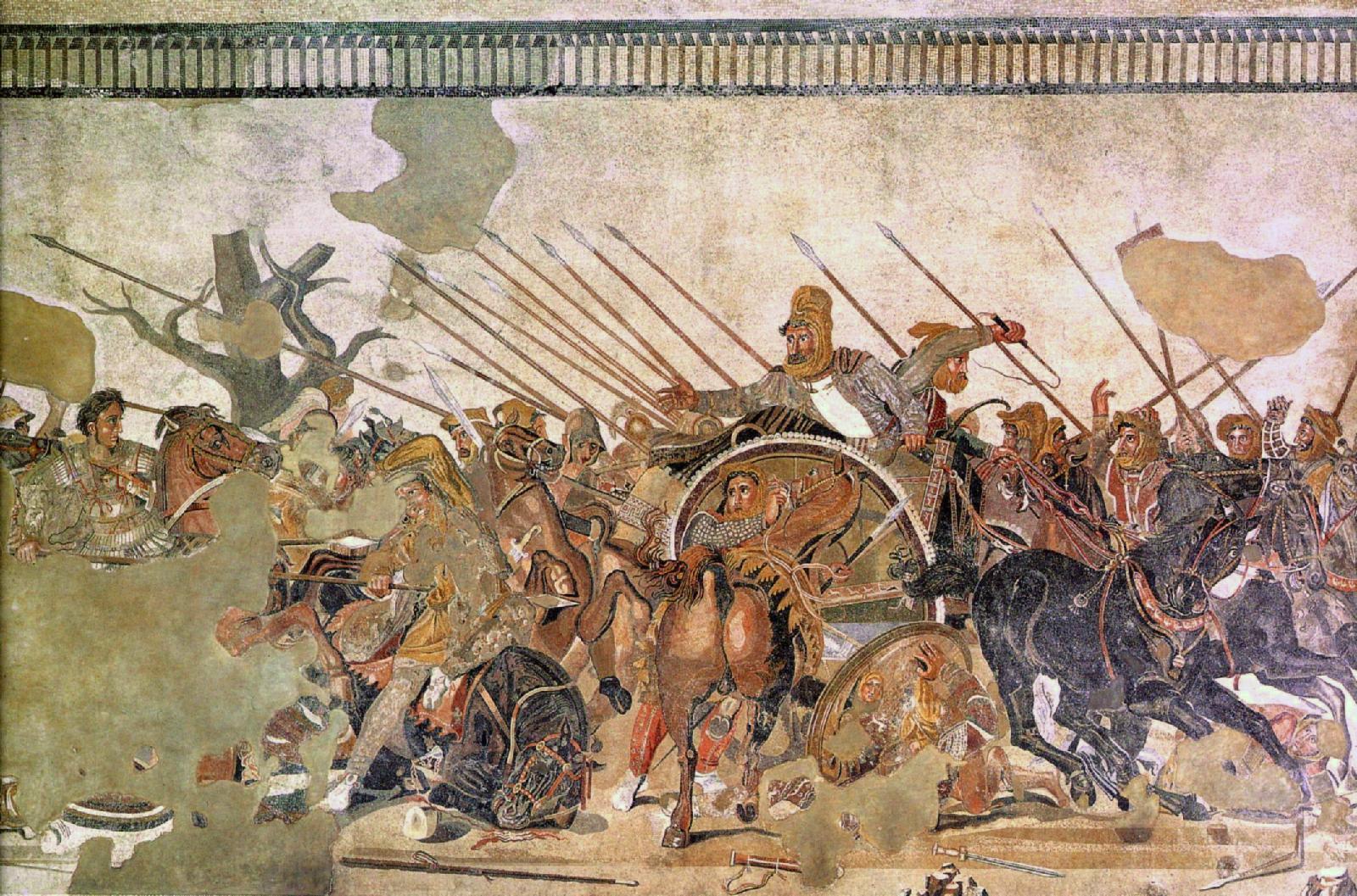 Alexander attacking Darius
III in the the Battle of Issus (mosaic) – First century BC in Pompeii
in the House of the Faun.
Alexander attacking Darius
III in the the Battle of Issus (mosaic) – First century BC in Pompeii
in the House of the Faun.
Perhaps after an earlier
3rd century BC Greek painting of Philoxenus of Eretria.
Archeological Museum of
Naples
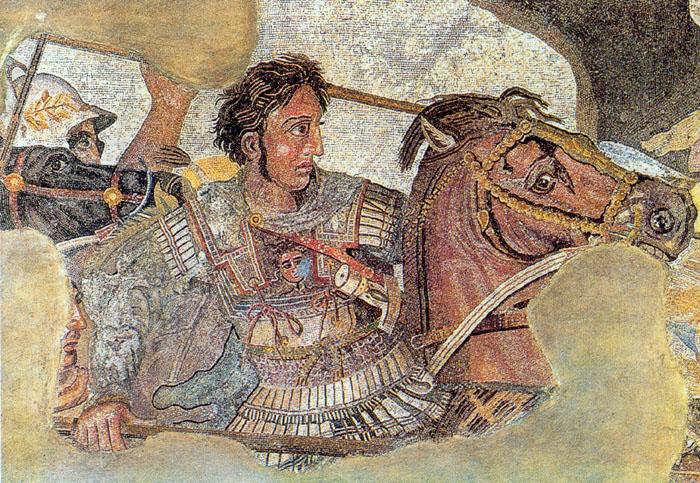 Alexander attacking Darius
during the Battle of Issus – detail
Alexander attacking Darius
during the Battle of Issus – detail
ALEXANDER'S EMPIRE IS CARVED UP |
With
Alexander's sudden death, a crisis arose over the matter of who was to
succeed him in overseeing his empire. Alexander's Bactrian wife
Roxana was pregnant, and if she were to deliver a son it was assumed
that he should rule … under the regency of Antipater of
Macedonia. But this set the generals themselves to fighting among
themselves for power (the "Wars of the Diadochi").
Perdiccas. At
first Alexander's cavalry general Perdiccas took control by killing
Meleager, the commander of Alexander's foot soldiers – leaving himself
in unquestioned command. But when Perdiccas attempted to make his
own assignments with regard to the governance of the various regions of
the empire, he found himself strongly resisted by Ptolemy of Egypt and
Antipater of Macedonia - individuals previously assigned their regional
commands by Alexander.
Cassander.
When
Perdiccas was then assassinated by his own officers (321 or 320 BC),
the foundations of the Alexandrian Empire began to break up. In
310 BC Cassander – who took his father Antipater's position when
Antipater died in 319 BC … and who was once an early friend of
Alexander and fellow student of Aristotle – had Alexander's wife Roxana
and their 13-year old son Alexander poisoned. Thus any likelihood
of a continuing single Alexandrian domain ended. What at that
point was taking
place was the rise of a number of independent kingdoms, usually founded
by one or another of Alexander's generals.
|
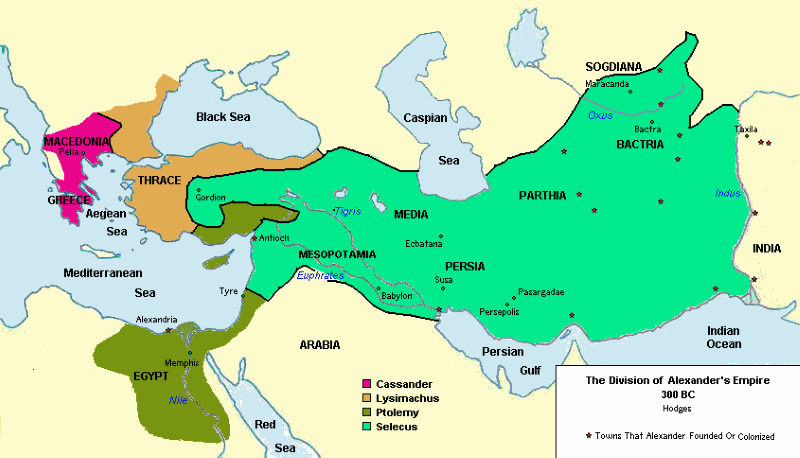
THE
ANTIGONID DYNASTY IN MACEDONIA-GREECE |
Antigonus,
governing the region of Syria and Asia Minor (today's central Turkey),
first stayed out of the in-fighting among the Alexandrian
generals. However, the migrating Celtic-speaking Gauls began to
invade a weakened Macedonia and Asia Minor at this point. This is
what brought Antigonus II to action, and in defeating the Gauls in 277
BC, brought him to kingship in Macedonia, and then in Greece
itself. But then he had to face another challenge, from the Greek
general Pyrrhus, who had been off fighting and defeating the Romans in
Italy, but at a great cost to himself financially and in the loss of
many of his troops (thus the term "Pyrrhic" victory). At first
Antigonus was brought to defeat by Pyrrhus. But then Pyrrhus was
killed in another battle deeper into Greece, effectively returning
Antigonus to power in Macedonia and Greece.
But the Greeks themselves were attempting to regain their independence
from Macedonian rule … resulting in a string of Greek rebellions – even
on into the reign of the next Antigonid, Demetrius, and after him,
Antigonus III. But the latter was able not only to hold off a new
group of invaders from the north, the Dardanians, but also put down a
Spartan rebellion – largely by working diplomatically with the Achaean
League (cities of the Peloponnese Peninsula – except the hostile
Sparta).
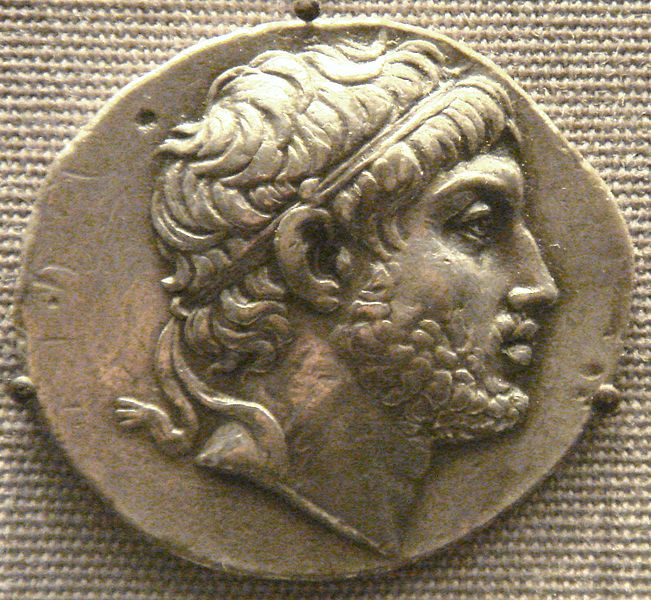 In
221 BC, the 17-year-old Philip (221-179 BC) was finally able to take
the Antigonid throne ... and soon proved his worth in forming a new
Hellenic League, which brought to an end the "Social War" (220-217 BC)
between the Achaean League and the Aetolian League (Corinth and cities
on the northern mainland), giving Philip full respect in both Macedonia
and Greece. In
221 BC, the 17-year-old Philip (221-179 BC) was finally able to take
the Antigonid throne ... and soon proved his worth in forming a new
Hellenic League, which brought to an end the "Social War" (220-217 BC)
between the Achaean League and the Aetolian League (Corinth and cities
on the northern mainland), giving Philip full respect in both Macedonia
and Greece.
Rome now enters the picture.
But mounting problems with Rome would occupy Philip greatly. At
one point he entered into a treaty with Carthaginian General Hannibal
(then ransacking the Italian countryside) ... only to have the Romans
enter into an alliance with the Aetolian League – which tended to
remain hostile to Macedonian rule. But with the Romans deeply occupied
with their 2nd Punic War with Carthage, Philip was able to finally
crush the Aetolian League in 205 BC. But in 200 BC, the Romans
took up the cause of some of the still-rebellious Greek cities and
attacked Philip's Macedon, bringing Philip and his army to defeat.
The Romans allowed Philip to keep his throne, but put him under Roman
dependency ... and forced him to pay an indemnity of a thousand talents
annually. But Philip proved to be cooperative with the Romans in
their war with the Seleucid King Antiochus III and eventually the
indemnity was lifted and Philip was allowed to rebuild his weakened
rule.
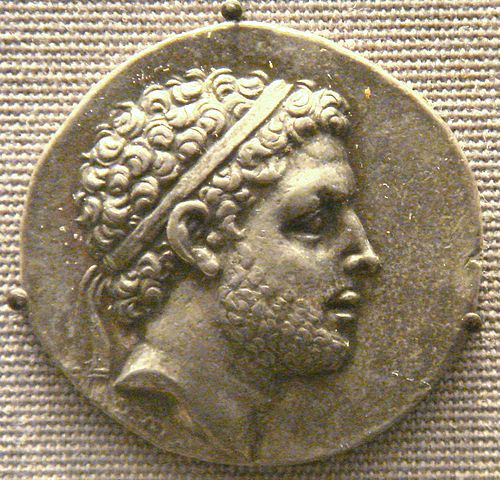 Perseus
(179-166 BC), who followed upon the death of his father Philip, would
be the last Antigonid king. At first Perseus conducted fairly
friendly relations with the domineering Romans. But the Romans
finally decided that he was a bit too independent and went to war with
him (Third Macedonian War, 171-168 BC) ... in which Perseus was
defeated and captured at the Battle of Pydna, was paraded in Rome in
chains and was imprisoned by the Romans. Additionally, some
300,000 Greeks were deported and enslaved by the Romans ... and their
land given to Roman settlers. This would finally bring an end to
the rule of the Antigonid dynasty in Macedonia-Greece. Perseus
(179-166 BC), who followed upon the death of his father Philip, would
be the last Antigonid king. At first Perseus conducted fairly
friendly relations with the domineering Romans. But the Romans
finally decided that he was a bit too independent and went to war with
him (Third Macedonian War, 171-168 BC) ... in which Perseus was
defeated and captured at the Battle of Pydna, was paraded in Rome in
chains and was imprisoned by the Romans. Additionally, some
300,000 Greeks were deported and enslaved by the Romans ... and their
land given to Roman settlers. This would finally bring an end to
the rule of the Antigonid dynasty in Macedonia-Greece.
Finally in 146 BC, Rome simply declared Macedonia to be a Roman
province. This then prompted the Greeks – spurred on by foolish
demagogues of the Greek cities of the Achaean League – to rise up in
revolt ... which turned out to be suicidal for the Greeks. As a
result, the city of Corinth was laid waste (similar to what happened to
Carthage that same year).
Following this, there were no further thoughts among the Macedonians or
Greeks about the possibilities of independence from Rome. They
were now permanently part of the Roman Empire.
1The
Roman legion proved itself to be a military formation superior to the
traditional Greek phalanx (more easily maneuvered in battle).
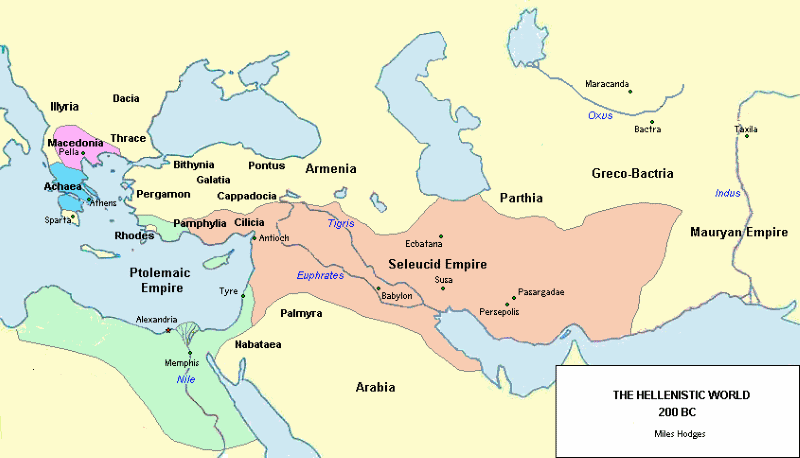
THE
SELEUCID EMPIRE IN THE EAST |
|
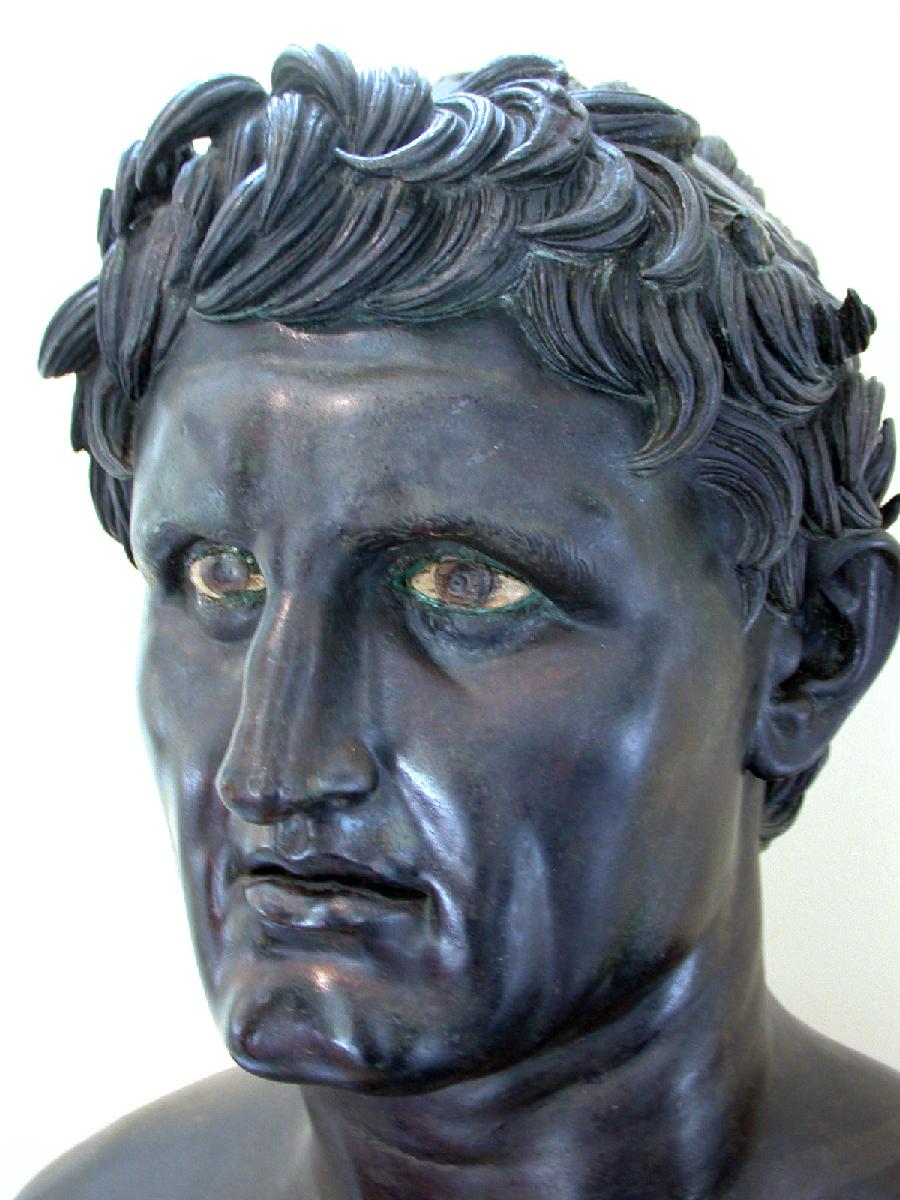 In the division of Alexander's Empire, infantry General Seleucus
Nicator would receive the largest section of the empire, approximately
the equivalent of the former Persian Empire … and all the problems that
went with it. Locating his own capital at Babylon in 305 BC,
Seleucus ruled Anatolia, Syria and Palestine, Mesopotamia, Persia,
Kuwait, Bactria (Afghanistan and Turkmenistan), and parts of what is
today Pakistan. However when Seleucus ran into serious opposition
in the eastern reaches of his empire from the Indian general
Chandragupta Maurya,2 he
entered into alliance with Chandragupta, handing over to him not only
much of the far eastern portions of the Empire (Afghanistan and
Pakistan) but also his daughter in marriage … receiving 500 elephants
in return – which Seleucus subsequently used to great advantage in his
battles elsewhere. In the division of Alexander's Empire, infantry General Seleucus
Nicator would receive the largest section of the empire, approximately
the equivalent of the former Persian Empire … and all the problems that
went with it. Locating his own capital at Babylon in 305 BC,
Seleucus ruled Anatolia, Syria and Palestine, Mesopotamia, Persia,
Kuwait, Bactria (Afghanistan and Turkmenistan), and parts of what is
today Pakistan. However when Seleucus ran into serious opposition
in the eastern reaches of his empire from the Indian general
Chandragupta Maurya,2 he
entered into alliance with Chandragupta, handing over to him not only
much of the far eastern portions of the Empire (Afghanistan and
Pakistan) but also his daughter in marriage … receiving 500 elephants
in return – which Seleucus subsequently used to great advantage in his
battles elsewhere.
But
much territory still remained to the new Seleucid dynasty that he
established. And into this land the Greeks migrated in large
numbers, bringing their language and culture ... leaving a permanent
mark on Central and West Asia that would only be replaced very slowly
by a return of the pre Greek cultures (but much changed through Greek
influence).
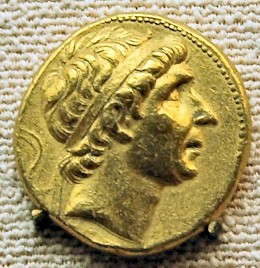 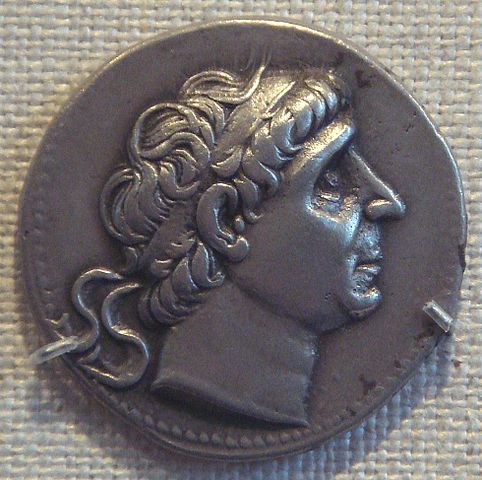 Seleucus'
son and grandson, Antiochus I (281-261 BC) and Antiochus II (261-246 BC), faced constant
challenges in the West as well – from the Egyptian Ptolemies and the
Celts (Gauls or Galatians) who were migrating into Asia Minor.
This ended up distracting Antiochus II so much that he lost control of
the satrapies of Bactria and Sogdiana (Afghanistan and
Turkmenistan) ... which however moved to independence as Greek Bactrian
States (c. 250 BC), Greek 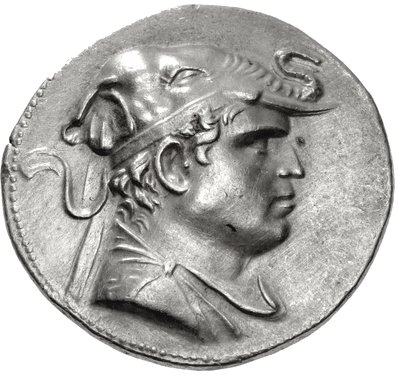 power centers by their own rights. power centers by their own rights.
Indeed, Greek
Bactrian King Demetrius I Aniketos
("the Invincible") would invade India in 180 BC and set up a Bactrian
Greek-Indian kingdom that would last over a century and a half.
Parthian independence (247 BC).
And Parthia (northeastern Iran) also moved to independence under the
Greek satrap Andragoras (also around 250 BC) … but was not able to
maintain its independence. An Asian (of Scythian origin?) named Arsaces
soon overthrew him and laid the foundations in Parthia for the Arsacid
Dynasty … which would eventually come to dominate all of Persia for
five centuries as the powerful "Parthian Empire" (247 BC – 224 AD).
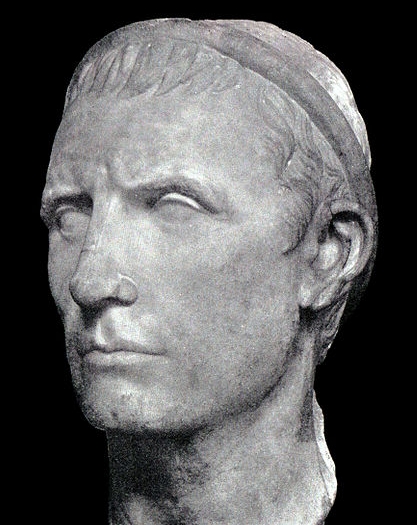 Antiochus III and the Romans. Antiochus
(223-187 BC) then made the fateful political decision to cooperate with the
Carthaginian General Hannibal – whose army at the time was thrashing
the Romans in their own homeland – in Antiochus's effort to liberate
mainland Greece from Roman influence. That was a mistake.
In four years of fighting between Antiochus's Seleucid army and the
Roman legions, Antiochus was slowly ground down by the Romans, in 188
BC had to accept humiliating terms for peace, and watched the eastern
provinces he had worked so hard to return to Seleucid control once
again go on their independent way. Likewise, he lost land in the
West (Anatolia, today's central Turkey) to Rome's allies Pergamum and
Rhodes. The next year he was killed (assassinated?) raiding
Persia in an attempt to gain the gold he was required to pay Rome as an
annual indemnity ... at the same time helping to establish Arsacid rule
in Persia in reaction to Antiochus's maneuvering. Antiochus III and the Romans. Antiochus
(223-187 BC) then made the fateful political decision to cooperate with the
Carthaginian General Hannibal – whose army at the time was thrashing
the Romans in their own homeland – in Antiochus's effort to liberate
mainland Greece from Roman influence. That was a mistake.
In four years of fighting between Antiochus's Seleucid army and the
Roman legions, Antiochus was slowly ground down by the Romans, in 188
BC had to accept humiliating terms for peace, and watched the eastern
provinces he had worked so hard to return to Seleucid control once
again go on their independent way. Likewise, he lost land in the
West (Anatolia, today's central Turkey) to Rome's allies Pergamum and
Rhodes. The next year he was killed (assassinated?) raiding
Persia in an attempt to gain the gold he was required to pay Rome as an
annual indemnity ... at the same time helping to establish Arsacid rule
in Persia in reaction to Antiochus's maneuvering.
Rome
now pretty much dictated matters ... at least within the Western
reaches of the Seleucid Empire (while the Eastern portions became
increasingly rebellious and independent). Seleucid kings came and went
in rapid succession ... and containing (or causing) civil strife
occupied most of their time in power.
By
the beginning of the 1st century BC little more than Damascus and the
area of Syria immediately around it was about all that the Seleucids
truly governed ... although they remained deeply involved in the
dynastic politics of the Eastern end of the Mediterranean Sea.
Far greater in power and importance by that time was the Greco Persian
(semi-Seleucid) kingdom of Pontus, to the north of Seleucid Syria ...
and encompassing all of Asia Minor and Anatolia (modern Turkey).
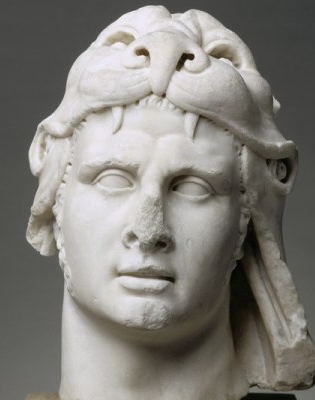 For a while Pontus's leader Mithridates VI
was able to hold off Roman power, defeating a Roman army in 89 BC. But
Rome was not going to let matters stand at that, and in 66 BC Roman
General Pompey took on Mithridates and set him and his army in flight.
Three years later. With Pompey closing in on him … and not wanting him
and his family to be subjected to a triumphal parade in Rome –
Mithridates chose suicide. At this point Seleucid Syria was simply
converted into a Roman province under the rule of a Roman governor. For a while Pontus's leader Mithridates VI
was able to hold off Roman power, defeating a Roman army in 89 BC. But
Rome was not going to let matters stand at that, and in 66 BC Roman
General Pompey took on Mithridates and set him and his army in flight.
Three years later. With Pompey closing in on him … and not wanting him
and his family to be subjected to a triumphal parade in Rome –
Mithridates chose suicide. At this point Seleucid Syria was simply
converted into a Roman province under the rule of a Roman governor.
2It is said that in a battle in 305
BC between the Greek and the Indian generals, Chandragupta was able to
field 600,000 troops and 9,000 elephants.
PTOLEMAIC (GREEK) EGYPT (323 - 30 BC) |
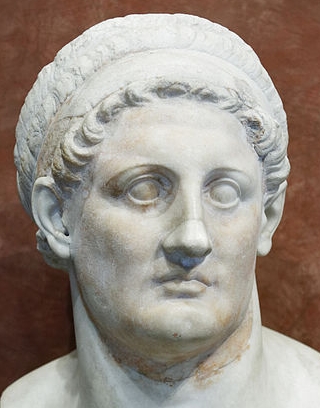 Ptolemy I Soter.
With Perdiccas's death, wide support existed for Ptolemy (r. 323-283
BC) to head up the Alexandrian Empire. Ptolemy wisely refused the
honor, understanding the many problems such an position would create
for him. Instead, he further consolidated his well-established
position in Egypt … as well as outlying areas along and across the
Mediterranean Sea. Ptolemy I Soter.
With Perdiccas's death, wide support existed for Ptolemy (r. 323-283
BC) to head up the Alexandrian Empire. Ptolemy wisely refused the
honor, understanding the many problems such an position would create
for him. Instead, he further consolidated his well-established
position in Egypt … as well as outlying areas along and across the
Mediterranean Sea.
Then in 305 BC he took the title of Pharoah, helping to legitimatize
his position among the Egyptians themselves. He hereby
established the beginning of a dynasty that would rule Egypt for the
next three centuries.
He also began the process of turning the Ptolemaic capital city
Alexandria into not only an economic and political power center ... but
also the most noble of all Hellenistic cities in terms of its
intellectual achievement (founding the great Royal Library of
Alexandria) ... one that even the eventual conquest of Egypt by the
Romans would not diminish.
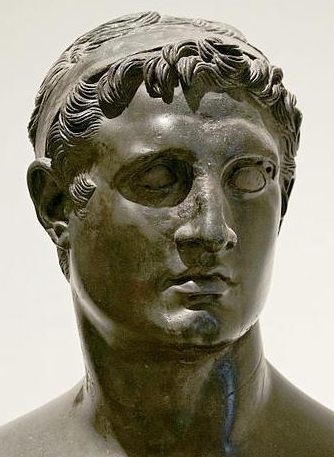 His son and successor, Ptolemy II Philadelphia (283-246 BC)
proved to be an equally capable ruler, his navy succeeding in fending
off a Seleucid attempt to grab southern Syria (Palestine/Judah).
And he also held off an attempt by invading Celts or Gauls to try to
establish themselves in Egypt (they did take control of part of Asia
Minor ... known subsequently as Galatia His son and successor, Ptolemy II Philadelphia (283-246 BC)
proved to be an equally capable ruler, his navy succeeding in fending
off a Seleucid attempt to grab southern Syria (Palestine/Judah).
And he also held off an attempt by invading Celts or Gauls to try to
establish themselves in Egypt (they did take control of part of Asia
Minor ... known subsequently as Galatia
He also continued the policy of his father to support the intellectual
development of the capital Alexandria ... expanding the Library and
supporting scientific research. It was during his rule that Greek
culture would establish itself as the dominant culture of Egypt.
The Septuagint Bible. And most importantly for Western Civilization, he was instrumental in having the Hebrew Bible translated into Greek as the Septuagint Bible.3
This brought this key piece of Jewish law and literature out of its
narrower Hebrew cultural world into the much broader Hellenistic world,
offering that almost "universal" Greek speaking world of the day easy
access to what would eventually become the start up section of Western
civilization's most foundational writing.
More Ptolemies … and Cleopatras!
Following Ptolemy II's death there were a succession of Ptolemies (for
a total of thirteen!). They increasingly took on Egyptian ways
... especially in marrying their sisters (frequently of the name
Cleopatra) such as the ancient Egyptian pharaohs had done.
Indeed, one of these Cleopatras (II) would rule from c. 175 BC to her
death in 116 BC through a series of husband brothers (Ptolemy VI:
180-145 BC; Ptolemy VIII: 144-132 BC) and then by herself (132-127) and
again with Ptolemy VIII and her daughter Cleopatra III (131-127
BC). It was all very incestuous ... and all very Egyptian.
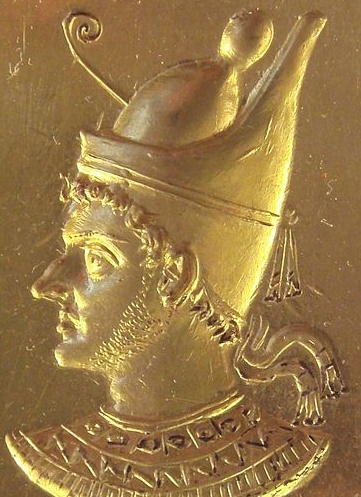 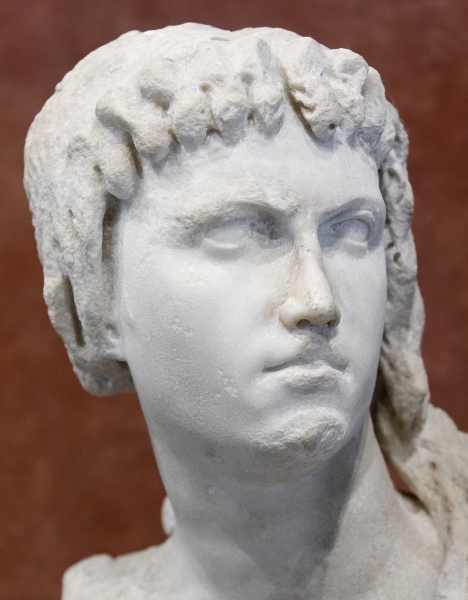 Ptolemy VI "Philometor" ("loves his mother")
and his sister-wife Cleopatra II
Ptolemy VI "Philometor" ("loves his mother")
and his sister-wife Cleopatra II
(or possibly her daughter Cleopatra III)
Louvre, Paris
And as a general rule among the Alexandrians, these Ptolemies found
themselves usually at war with the Seleucids of Syria as well as the
Macedonians of old Greece. And of course these dynastic quarrels
and the political confusion they generated began to weaken seriously
the Ptolemaic dynasty ... so much so that the Romans simply moved
themselves gradually into the position of protectors of Ptolemaic Egypt
(just as they had done initially with Macedonia) … after 80 BC when an
Alexandrian mob lynched Ptolemy XI (who ruled only a few weeks) after
he murdered his stepmother – who was also his cousin and probably half
sister.
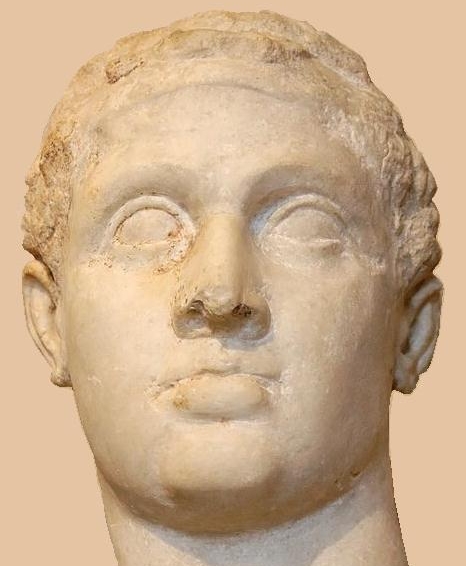 The next Ptolemy (Ptolemy XII, popularly known as "Auletes"
or "Flute player") was actually more of a Roman client than a true
Egyptian ruler. At one point he was driven from power (58 BC) and
exiled to Rome by his daughter Bernice IV ... but restored to his
throne in 55 BC by the Romans (after Ptolemy made a payment of 10,000
talents to one of Roman Consul Pompey's Generals). But at this
point Auletes enjoyed his power only through the support of Rome. The next Ptolemy (Ptolemy XII, popularly known as "Auletes"
or "Flute player") was actually more of a Roman client than a true
Egyptian ruler. At one point he was driven from power (58 BC) and
exiled to Rome by his daughter Bernice IV ... but restored to his
throne in 55 BC by the Romans (after Ptolemy made a payment of 10,000
talents to one of Roman Consul Pompey's Generals). But at this
point Auletes enjoyed his power only through the support of Rome.
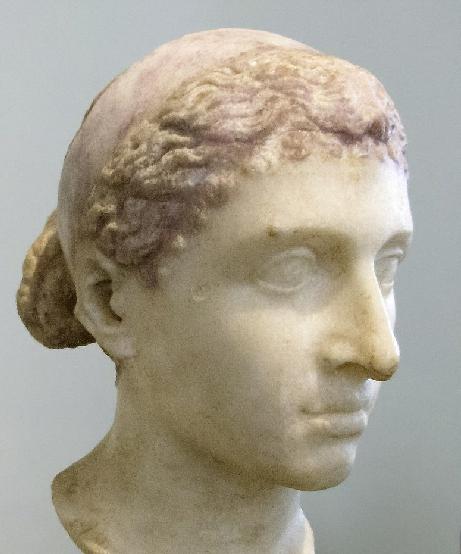 Cleopatra VII and Mark Anthony.
When he died of illness in 51 BC, he was followed on the throne by
another daughter, the 18 year old Cleopatra VII – who had served with
him as co regent during the last year of his life – as well as her
brother and husband Ptolemy XIII ... but the latter only briefly.
After a failed attempt to win Julius Caesar's support by murdering
Pompey, who had fled to Egypt to escape Caesar, Ptolemy XIII was
defeated (with the help of Caesar, who was her lover!) and died in 47
BC in a civil war he waged against her. Cleopatra then chose another
younger brother (and husband) Ptolemy XIV to rule with her. Cleopatra VII and Mark Anthony.
When he died of illness in 51 BC, he was followed on the throne by
another daughter, the 18 year old Cleopatra VII – who had served with
him as co regent during the last year of his life – as well as her
brother and husband Ptolemy XIII ... but the latter only briefly.
After a failed attempt to win Julius Caesar's support by murdering
Pompey, who had fled to Egypt to escape Caesar, Ptolemy XIII was
defeated (with the help of Caesar, who was her lover!) and died in 47
BC in a civil war he waged against her. Cleopatra then chose another
younger brother (and husband) Ptolemy XIV to rule with her.
When Caesar was assassinated in 44 BC, she attempted to have her son,
Caesarion (born from the affair with Caesar) to take his place in
Rome. But Caesar's grandnephew Octavian took that position
instead. Nonetheless, she had her brother Ptolemy XIV murdered
(also 44 BC) and then elevated her son Caesarion to co rulership with
her in Egypt.
Following the assassination of Caesar, Rome itself fell into a series
of civil wars among a number of Roman contenders for power.
During this period the Eastern half of the Roman Empire (including
Egypt) came under the command of the Roman politician and general Mark
Antony (ca. 42 BC) ... with the Western half under his ally Octavian
Caesar.
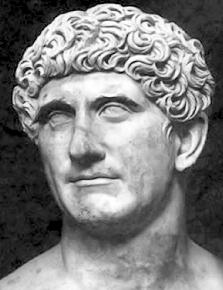 This
eventually brought Mark Antony into a relationship where he and
Cleopatra openly became lovers (including the birthing of three
children) ... despite the fact that Mark Antony was married to
Octavian's sister, Octavia. This would become part of the reason
for a growing split between the former allies Octavian and Mark
Antony. By 33 BC the two Roman leaders were in full conflict with
each other and in 31 BC, in a major battle at Actium, Octavian's forces
decisively defeated the forces of Mark Antony and Cleopatra. This
eventually brought Mark Antony into a relationship where he and
Cleopatra openly became lovers (including the birthing of three
children) ... despite the fact that Mark Antony was married to
Octavian's sister, Octavia. This would become part of the reason
for a growing split between the former allies Octavian and Mark
Antony. By 33 BC the two Roman leaders were in full conflict with
each other and in 31 BC, in a major battle at Actium, Octavian's forces
decisively defeated the forces of Mark Antony and Cleopatra.
Both Mark Antony and Cleopatra presumably chose suicide rather than
face the humiliation at the hands of Octavian. Cleopatra's 17
year old son Caesarion was executed soon after. The Ptolemaic
line of pharaohs had come to end. Egypt was now formally a Roman
province under the rule of a Roman governor (30 BC).
3"Septuagint"
from the idea of "Seventy" ... the number of Jewish scholars
commissioned by Ptolemy II to come up with a Greek translation of
the Hebrew Scripture or Bible. These 70 scholars worked
independently of each other. In the 70-day period in which they did their work, they presumably came up with exactly the same Greek translation – word for word – something considered miraculous then ... and today!
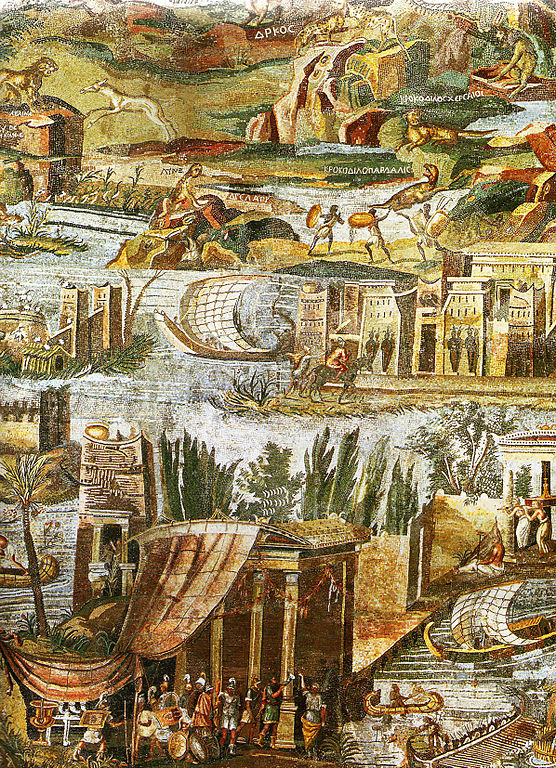 The Nile mosaic of Palestrina,
showing Ptolemaic Egypt (c. 100 BC) The Nile mosaic of Palestrina,
showing Ptolemaic Egypt (c. 100 BC)
Paris, Louvre Museum
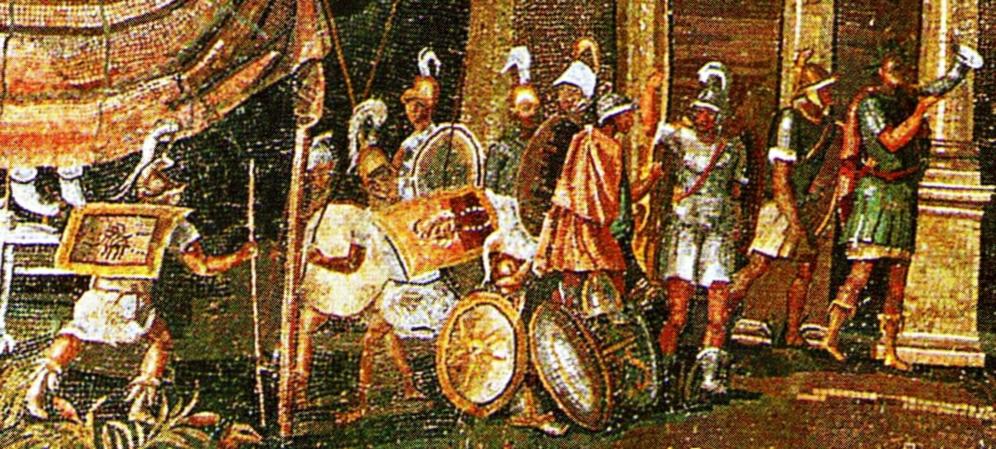
Hellenistic soldiers circa
100 BC - A detail of the Nile mosaic of Palestrina
THE DEVELOPMENT
OF HELLENISTIC CULTURE |
|
The dominating role of the Greek language
With Alexander's success, the civilized "Western" world was united by a
new sense of Greek cultural hegemony. Though local peoples might
cling to their more ancient tribal or regional ways, the Greek language
and culture quickly established themselves throughout the whole of the
Eastern Mediterranean (and the hinterland) as the medium of literature,
philosophy and science.
Thus Alexander did more than any actual Greek in establishing the Greek
language as the dominant international tongue used by scholars,
scientists, tradesmen, governing officials, not only in Alexander's day
but for centuries to come. Even when Rome expanded its military
power into the Eastern Mediterranean it did not supplant Greek with its
own Latin. Indeed the Roman government itself took up the use of
Greek in administering its Eastern holdings.
The original works of Christian Scripture were not in Hebrew (which
anyway had passed out of daily use in Jesus's times) or even Aramaic (a
local Semitic language used in Syria/Palestine) ... but in Greek,
considered the only language adequate to cross the lines separating the
various cultural groups making up the Middle East. Even Paul's
letter to Rome was written in Greek, not Latin. Eventually a
translation had to be made from the Greek into Latin (the Latin
"Vulgate" translated by the monk Jerome in the late 300s, long after
Christianity had been formally accepted as the official religion of the
Roman Empire) – which the Western Church then went on to adopt as its
official translation of the original Greek.
A shift to a new sense of order in life
But this great Greek achievement came at a time of continuing confusion
among the Greeks as to what the ideals of life ought to be.
Certainly Alexander's imperial political legacy made trivial any
residual Greek affections for the city-state – though certainly such
sentiments were slow to die. The domain of politics now rested in
the hands of lofty rulers – ones who even took on the Eastern
affectation of being "gods." The noble Greek citizen directing
the course of his cherished city was now an anomaly, even a dangerous
one at that.
But even beyond these changes in political style and vision lay other
major changes in Greek life. Just as politics seemed to slip out
of the hands of the Greek commoner and move to the loftier realm of
royal, almost god-like authority, so even the sense of the source of
life seemed to move away in the same direction. Life now seemed
shaped by forces that greatly transcended direct human
management. To achieve any sort of sense of connectedness with
such transcendent sources, a person now had to look well beyond the
realm of the surrounding physical or material reality – to the mystical
realm of the Divine. True, the Greeks held on to their gods,
personal protectors whom they hoped would protect them and intercede on
their behalf with the higher forces of the universe. But
ultimately they knew that it was with these higher forces that all
things in the end drew their power, their direction, their life.
Such a realm was not necessarily hostile. It was not necessarily
chaotic. Indeed, a new Order seemed to be the rule of the
day. But it was distant, beyond the easy understanding of the
common man, mysterious in its nature and action. To reach such a
realm required enormous amounts of concentration of human thought and
understanding. Perhaps only those who had the luxury of free time
could ever achieve such a connection, such a relationship with the
ultimate.
Thus
in general, common folk turned increasingly to the mystery cults and
religions brought forward out of older times ... such as the Eleusinian
Mysteries involving the secret cults of Demeter and Persephone – cults
that reached all the way back to the Mycenean age. They also
looked to religions brought in from outside the Hellenistic world ...
such as Mithraism, a part of the Persian or Iranian Zoroastrian
tradition.
But while this tended to satisfy the general population, it seemed to
have less impact on the more educated of Hellenistic society ... who
attempted to keep alive the rich Hellenic philosophical tradition of
intellectual inquiry into the kosmos and its ways.
However Hellenistic philosophy began to take on a more complex
character. It could no longer be found just in simple dialogues
between a teacher and a citizen-student as in Socrates' days. It
now required profound devotion to study, a deep focusing of oneself on
the task, meditation, prayer even, to reach the goal of
understanding. Philosophy was now itself a mystical, spiritual
enterprise – engaged in by specialists.
A big part of that mysticism came from the deep reverence for the
starry heavens, which Greek philosophers (such as Aristotle) had been
certain presided over life on earth. Thus ongoing "scientific" study of
the heavens was supposed to bring new insights into related events on
earth ... even the power to predict the course of future events both
social and personal. Thus there was a huge development of
astrology.
However this derived not only from the research that the Greeks had
undertaken in their study of the heavens, but also from the quite
sophisticated astrological mysteries brought in from the East – thanks
to Alexander's conquest and subsequent uniting of the Asian East with
the Greek West.
In short, the mysticism of the East inserted itself deeply into the
pragmatism of the West, producing an amalgam Greek in language but
Asian in spirit which we call Hellenism.
Cynicism and Skepticism
Cynicism
and Skepticism involve two different degrees of questioning life's
underlying or fundamental order … the two philosophies being in ancient
Greek times almost the reversal of what they have come to represent
today. Today, skepticism implies that someone is holding some doubts
about how things seem to appear to be. To the skeptic, they may not be
what they seem to be. Cynicism today means having no doubts at all
about such matters … for to the cynic, nothing is ever to be trusted!
To the ancient Greek, these ideas were quite the opposite of what we
hold them to be today.
Cynicism actually started even before the Alexandrian era … most notably under the Greek philosopher Diogenes of Synope (c. 412-323 BC).
Diogenes, a contemporary of Plato and Aristotle, simply chose to escape
the world of wealth and power and try to live the simplest life
possible, such as does an animal. To Diogenes, the life of a dog
(Greek: kuon or kyon, from which the word "cynic" is derived) has
greater integrity than the life of the wealth-and-power-grasping
human. But like his contemporaries, Plato and Aristotle, Diogenes
still believed that it was possible, by deciding to go down the right
road in life, to come to excellence as a person. In short, he was not
at all cynical about human possibilities … though skeptical at times!
He truly believed that there was hope that humankind could pull out of
the mess he was observing around him in his pre-Alexandrian Greece. |
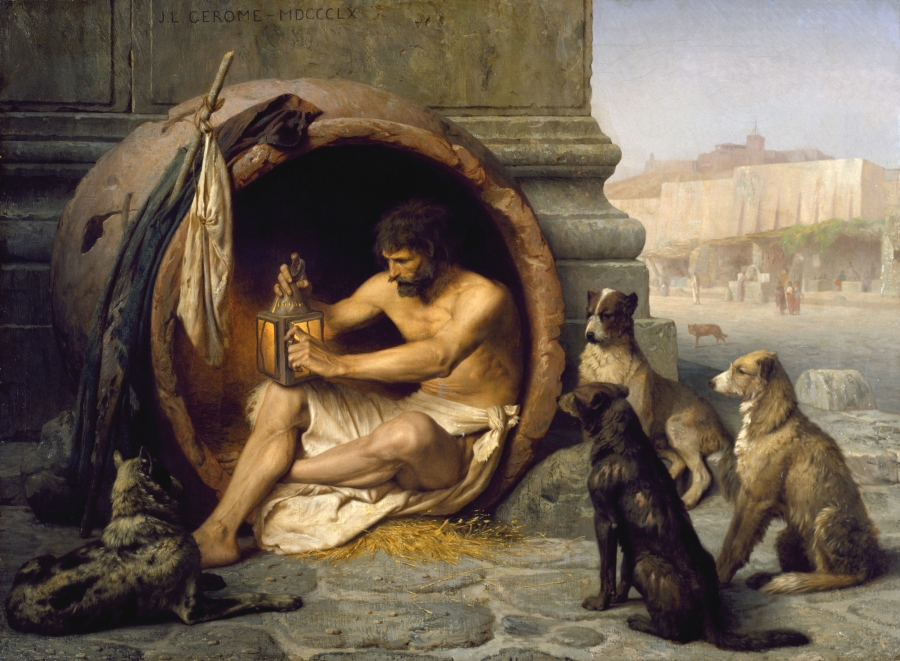
Diogenes the Cynic in his tub - by Jean-Léon Gérôme (1860)
Walters Art Museum - Baltimore
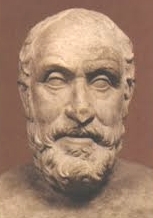 But in the post-Alexandrian world, that optimism seemed to fade away. Pyrrho of Elis (c. 360-270 BC)
took on something similar to a Buddhist or Hindu attitude in concluding
"skeptically" that true knowledge, true goodness, true anything, was
humanly unattainable. He felt that life would be simpler and
happier if people simply gave up trying to find perfection … and
accepted the fact that life has its times of grand disappointment as
well as moments of glory – and that there is little that we can do to
determine those results. Also to Pyrrho, simply following tradition –
rather than trying to come up with new, more progressive ideas
intellectually – worked better for everyone in the long run. But in the post-Alexandrian world, that optimism seemed to fade away. Pyrrho of Elis (c. 360-270 BC)
took on something similar to a Buddhist or Hindu attitude in concluding
"skeptically" that true knowledge, true goodness, true anything, was
humanly unattainable. He felt that life would be simpler and
happier if people simply gave up trying to find perfection … and
accepted the fact that life has its times of grand disappointment as
well as moments of glory – and that there is little that we can do to
determine those results. Also to Pyrrho, simply following tradition –
rather than trying to come up with new, more progressive ideas
intellectually – worked better for everyone in the long run.
But exactly what those more useful traditions actually happened to be
Pyrrho never clarified … leaving the matter for the individual to
decide. Ultimately, there was nothing to keep a skeptic from
disavowing all intellectual standards and simply following a life of
wantonness.
Epicureanism
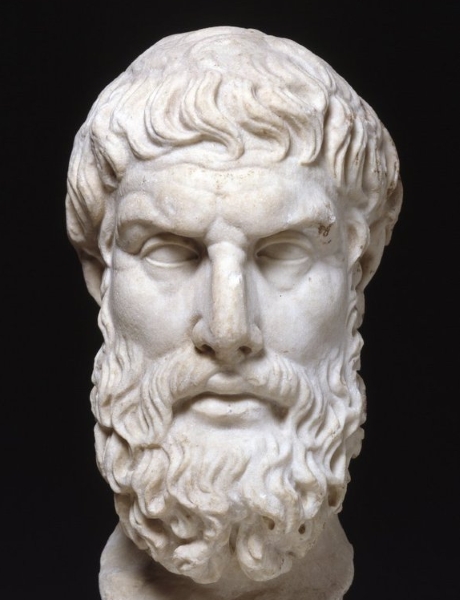 Epicurus (342-270 BC)
was not actually the "eat, drink, and be merry" individual that we
associate with being an "Epicurean" today. He did however
certainly support the idea of the pursuit of pleasure. But to
him, such pleasure was found in a life free of pains and hurts, because
a person has chosen to live a life of virtue. But what that life
of virtue actually consisted of Epicurus was not of Socrates's variety
… that is, of finding the higher realm of truth and goodness and then
staying focused on living according to those standards. Rather,
to Epicurus, the definition of the virtuous life that brings real
pleasure was a rather subjective one … not really anchored on standards
lying above an individual's own preferences on the matter. In
short, because to Epicurus pleasure was purely subjective, a person was
easily led to the understanding that whatever a person craves is the
ultimate good for that person. Epicurus (342-270 BC)
was not actually the "eat, drink, and be merry" individual that we
associate with being an "Epicurean" today. He did however
certainly support the idea of the pursuit of pleasure. But to
him, such pleasure was found in a life free of pains and hurts, because
a person has chosen to live a life of virtue. But what that life
of virtue actually consisted of Epicurus was not of Socrates's variety
… that is, of finding the higher realm of truth and goodness and then
staying focused on living according to those standards. Rather,
to Epicurus, the definition of the virtuous life that brings real
pleasure was a rather subjective one … not really anchored on standards
lying above an individual's own preferences on the matter. In
short, because to Epicurus pleasure was purely subjective, a person was
easily led to the understanding that whatever a person craves is the
ultimate good for that person.
Epicurus also believed that we were wasting our time speculating on the
nature of some kind of higher realm, especially one that perhaps
follows death, that we would do well simply to explore the
material-mechanical world around us … and make the most of that
practical or physical world.
Stoicism
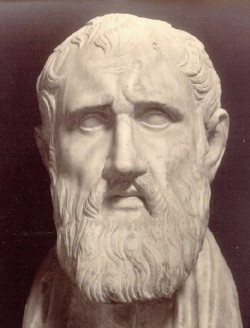 Stoicism actually had its origins in Cynicism … although Zeno of Citium (336-264 BC)
took the matter well beyond a simple retreat from the material world in
to a life of simplicity. Zeno, who came to Athens to teach his
ideas to students gathered under him at the Stoa (Porch) located in the
Athenian marketplace (thus "Stoicism"!) believed that there was great
purpose in bringing to anyone's life the practice of deep contemplation
about the mysteries of the world … bringing human life under such
mystical discipline in order to truly free up that life. Stoicism actually had its origins in Cynicism … although Zeno of Citium (336-264 BC)
took the matter well beyond a simple retreat from the material world in
to a life of simplicity. Zeno, who came to Athens to teach his
ideas to students gathered under him at the Stoa (Porch) located in the
Athenian marketplace (thus "Stoicism"!) believed that there was great
purpose in bringing to anyone's life the practice of deep contemplation
about the mysteries of the world … bringing human life under such
mystical discipline in order to truly free up that life.
Following something of a Socratic or Platonic tradition, Zeno was
confident that there existed some kind of Divine Reason (the Logos), an
ultimate reality beyond mere physical appearances. Thus he taught
that the human mind could – and most certainly should – attach itself
to this Logos in pure devotion.
He also taught (in strong distinction to Epicurus) that we should bring
our personal cravings under the mastery of a mind-over-matter
life. In the face of life's many difficulties, this was
particularly important … that is, important to stay focused on the
Logos – and not the worries or hurts of the moment. This
"quietism" ultimately became the hallmark of the Stoic.
Most interestingly – perhaps because it offered such hope to a world
that seemed to find little logic in the way political and social
affairs seem to be moving at the time – Stoicism soon became a
widespread philosophy across the Greek world. It would even make
its way into the Roman realm.
The development of the physical sciences
But at the same time, the larger Alexandrian world seemed to offer a
new sense of order … or at least point to the possibility of one being
achieved – in the same way that Alexander had so quickly achieved so
much.
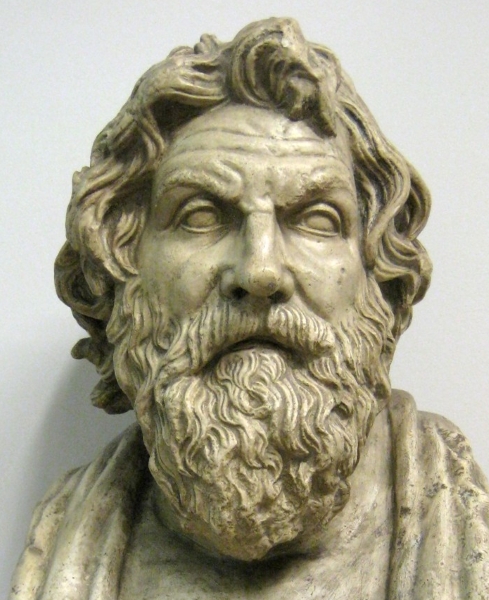 Thus Aristarchus of Samos (c. 310-230 BC)
came to have a very lofty view of the universe, even as a young man
publishing a work (lost to us today) declaring that the sun was 19
times the size and distance of the moon (actually the figure is about
400 times the size and distance) – something that seemed to defy the
common sense of his times that the sun and moon differed only in the
intensity of their light, not their size and distance. He even
stated that the sun was much larger than the earth … and therefore it
was most likely that the smaller earth circled the larger sun (the
heliocentric theory), rather than the reverse (the geocentric theory) –
as it was viewed at the time. Of course all of this was
ridiculed in Aristarchus's day … though defended and promoted (a
century later) by Seleucus. But sadly, it ultimately got dropped
in Western thinking for the longest time. Thus Aristarchus of Samos (c. 310-230 BC)
came to have a very lofty view of the universe, even as a young man
publishing a work (lost to us today) declaring that the sun was 19
times the size and distance of the moon (actually the figure is about
400 times the size and distance) – something that seemed to defy the
common sense of his times that the sun and moon differed only in the
intensity of their light, not their size and distance. He even
stated that the sun was much larger than the earth … and therefore it
was most likely that the smaller earth circled the larger sun (the
heliocentric theory), rather than the reverse (the geocentric theory) –
as it was viewed at the time. Of course all of this was
ridiculed in Aristarchus's day … though defended and promoted (a
century later) by Seleucus. But sadly, it ultimately got dropped
in Western thinking for the longest time.
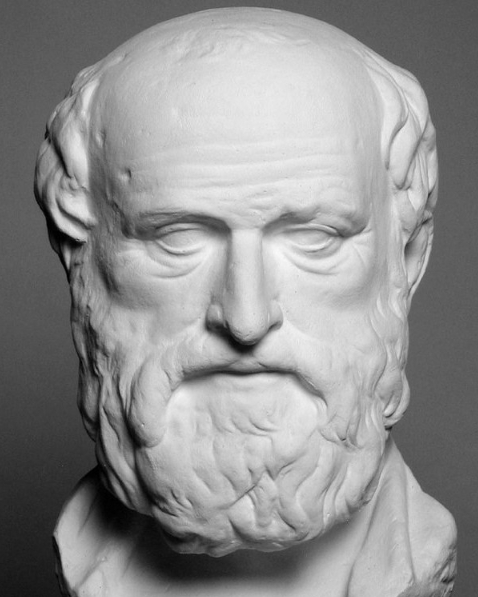 Then there was Eratosthenes (c. 276-192 BC),
the head librarian at the huge museum and library of Alexandria Egypt,
who conducted an unheard-of experiment in calculating the curvature of
the earth by measure the length of shadows at the exact same moment in
two different locations in Egypt … and came up with a figure that gave
the earth the estimate of being (by today's measurements) 24,660
miles in circumference … only 200 miles less than the actual
measure! He also made the bold claim that a person could
theoretically sail around the world and arrive back at the same staring
point, provided that he never changed course along the way. And
additionally, he cataloged nearly 700 stars … as well as a system of
calculating prime numbers. Then there was Eratosthenes (c. 276-192 BC),
the head librarian at the huge museum and library of Alexandria Egypt,
who conducted an unheard-of experiment in calculating the curvature of
the earth by measure the length of shadows at the exact same moment in
two different locations in Egypt … and came up with a figure that gave
the earth the estimate of being (by today's measurements) 24,660
miles in circumference … only 200 miles less than the actual
measure! He also made the bold claim that a person could
theoretically sail around the world and arrive back at the same staring
point, provided that he never changed course along the way. And
additionally, he cataloged nearly 700 stars … as well as a system of
calculating prime numbers.
Tragically these amazing discoveries did not fit well with the
preconceptions of the times … and were dismissed by other
intellectuals.
For instance, Hipparchus (fl. 145-130 BC)
argued strongly against Aristarchus's heliocentric theory … pointing out
that there were serious problems mathematically with the theory.
Of course, neither he nor Aristarchus had taken into account the
gravitational effect of the sun's surrounding planets or the elliptical
way that things seemed to move in the heavens. That would come
only many, many centuries later. Thus it was that he would help
the mathematician Ptolemy (fl. early 100s AD) use very complicated
mathematical formulas to put the earth back at the center of
things … the geocentric theory that would last all the way to the time
of the West's Renaissance in the 1500s (Copernicus) and the early 1600s
(Brahe, Galileo, and Kepler).
Mathematics was another field of great accomplishment, Euclid (fl. c. 300 BC) putting together in his Elements,
a clear and precise explanation of the laws of geometry … used all the
way down to modern times as the model for that mathematical
field. And there was Archimedes of Samos (c. 310-230 BC) who
in his Sand Reckoner (212 BC) not only laid out the major laws of
engineering and physics … but was able to put those to use in helping
his native city of Syracuse defend itself using his clever inventions
against besieging Romans (although tragically the Romans won
anyway). Interestingly also, he came very close to inventing the
calculus, something not finally attained until 1,900 years later
(Newton and Leibniz).
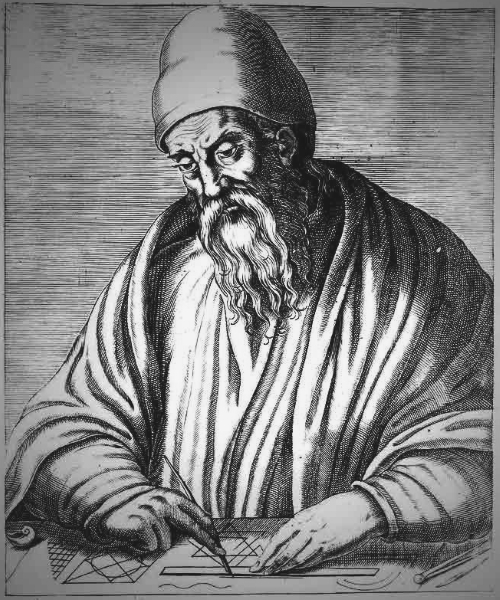 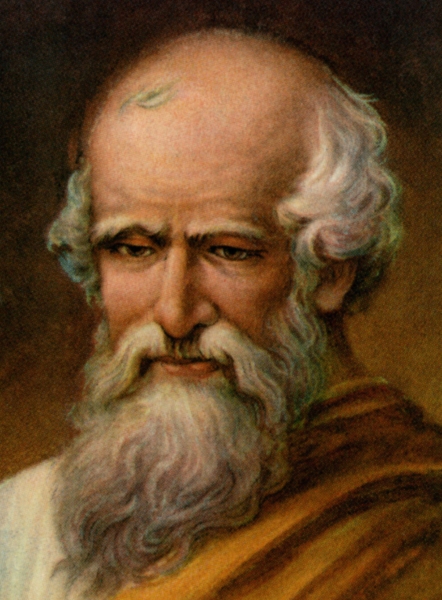
Euclid Archimedes
|

Go on to the next section: Society and Culture of the Roman Republic
 Miles
H. Hodges Miles
H. Hodges
| | | | | |

 A general overview of the Hellenistic
A general overview of the Hellenistic Alexander ... and his conquest of the
Alexander ... and his conquest of the Alexander's Empire is carved up
Alexander's Empire is carved up
 The Seleucid Empire in the East
The Seleucid Empire in the East
 The development of Hellenistic culture
The development of Hellenistic culture





 Though
Alexander's power was clearly based on the support of his very
practical-minded Macedonian-Greek army, Alexander soon began to
envision himself as a great Oriental god-king sent to rebuild
civilization in what he supposed was the entire reach of the
world. He planted cities with Greek colonists wherever he went,
urged his soldiers to take wives from among the Persians and other
Oriental peoples (as he himself did in marrying the Bactrian princess,
Roxana), and did what he could to rebuild Western Asian civilization on
a mix of Greek and Oriental culture. His loyal troops humored him
in his thoughts, though they themselves were very unlikely candidates
for ever seeing Alexander as a god – as the Orientals so easily came to
see their new ruler.
Though
Alexander's power was clearly based on the support of his very
practical-minded Macedonian-Greek army, Alexander soon began to
envision himself as a great Oriental god-king sent to rebuild
civilization in what he supposed was the entire reach of the
world. He planted cities with Greek colonists wherever he went,
urged his soldiers to take wives from among the Persians and other
Oriental peoples (as he himself did in marrying the Bactrian princess,
Roxana), and did what he could to rebuild Western Asian civilization on
a mix of Greek and Oriental culture. His loyal troops humored him
in his thoughts, though they themselves were very unlikely candidates
for ever seeing Alexander as a god – as the Orientals so easily came to
see their new ruler.



















 This
eventually brought Mark Antony into a relationship where he and
Cleopatra openly became lovers (including the birthing of three
children) ... despite the fact that Mark Antony was married to
Octavian's sister, Octavia. This would become part of the reason
for a growing split between the former allies Octavian and Mark
Antony. By 33 BC the two Roman leaders were in full conflict with
each other and in 31 BC, in a major battle at Actium, Octavian's forces
decisively defeated the forces of Mark Antony and Cleopatra.
This
eventually brought Mark Antony into a relationship where he and
Cleopatra openly became lovers (including the birthing of three
children) ... despite the fact that Mark Antony was married to
Octavian's sister, Octavia. This would become part of the reason
for a growing split between the former allies Octavian and Mark
Antony. By 33 BC the two Roman leaders were in full conflict with
each other and in 31 BC, in a major battle at Actium, Octavian's forces
decisively defeated the forces of Mark Antony and Cleopatra.










